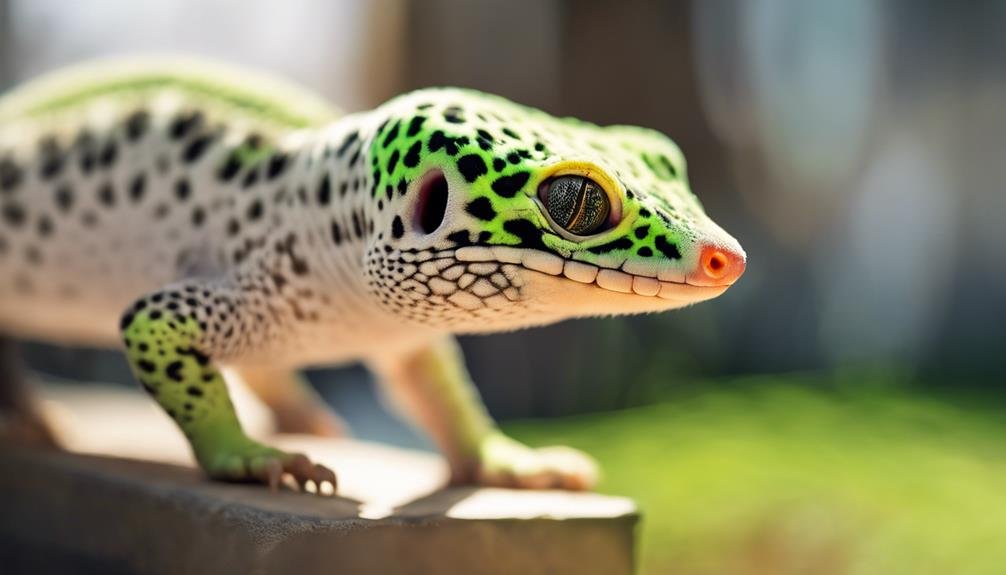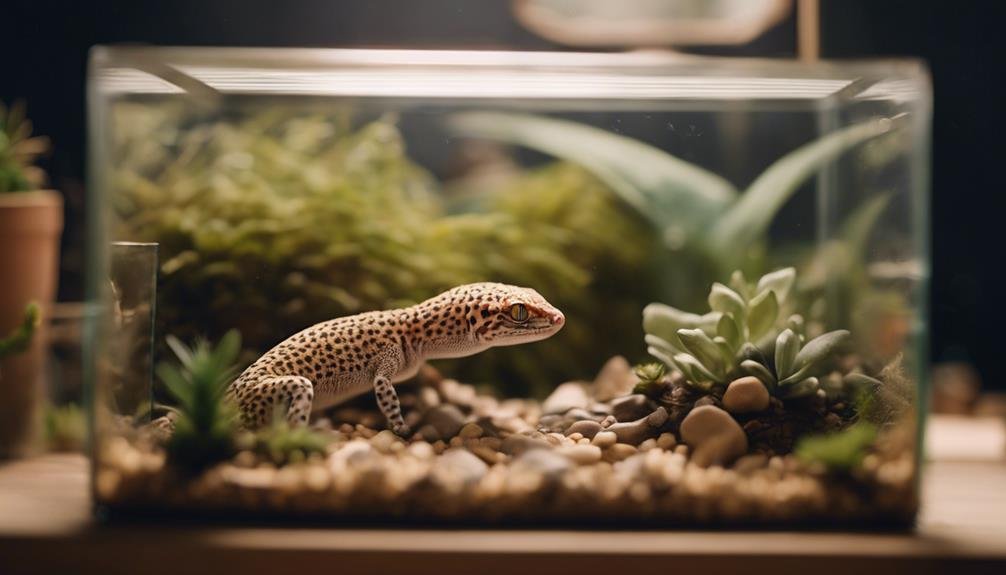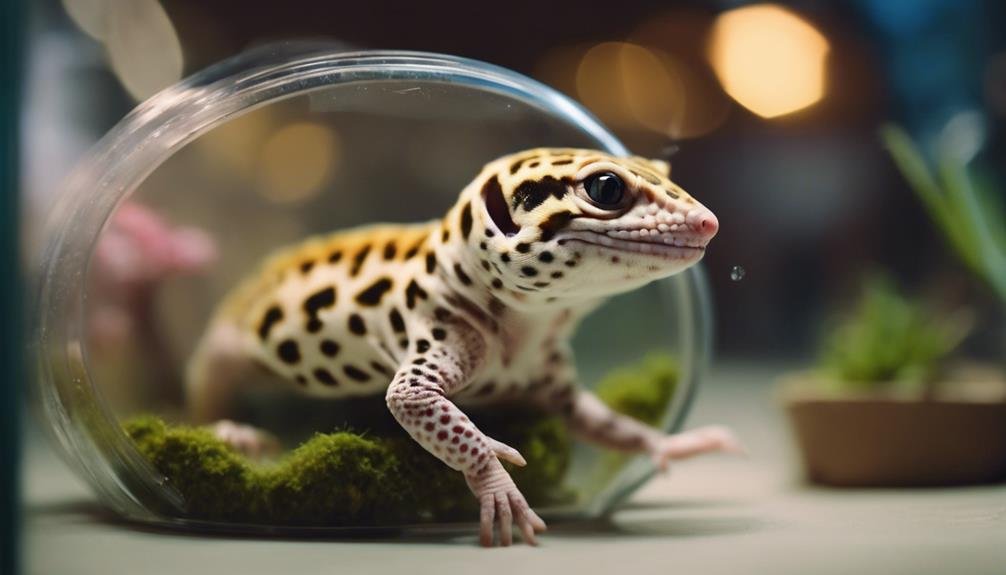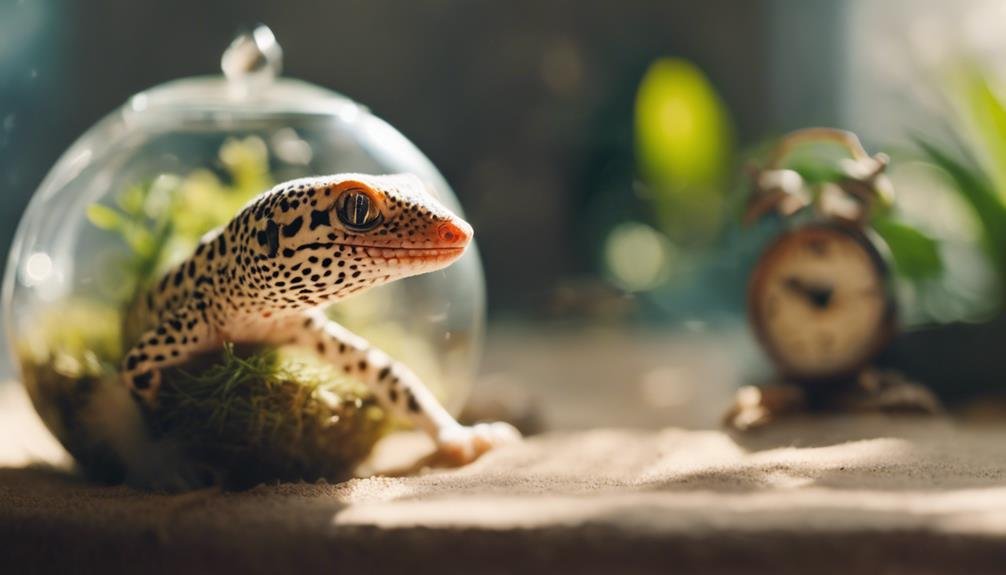You might often find yourself pondering whether your leopard gecko’s lengthy slumbers are a sign of laziness or an indicator of sickness. Given they naturally sleep for about 12-14 hours, distinguishing between a healthy rest pattern and potential health issues becomes vital. If you’ve noticed your gecko sleeping excessively or showing signs of lethargy and decreased appetite, it could signal something more concerning than just needing a good day’s rest. Identifying what’s normal and what’s not is key to ensuring your pet’s health and well-being. So, how can you tell the difference, and when should you start worrying? Let’s explore the subtle signs that suggest it’s time to pay closer attention to your gecko’s sleeping habits.
Key Takeaways
- Leopard geckos typically sleep 12-14 hours a day, aligning with their crepuscular nature.
- Excessive sleep beyond 20 hours can indicate illness, stress, or environmental discomfort.
- Normal sleep patterns involve active periods at dawn and dusk, with rest during the day.
- Changes in sleep patterns, coupled with lethargy or refusal to eat, warrant a vet consultation.
- Ensuring a suitable habitat with proper temperature gradients and hiding spots supports healthy sleep.
Understanding Leopard Gecko Sleep
One must understand that Leopard geckos can sleep for up to 18-20 hours a day, a necessity given their cold-blooded nature and the need for energy conservation. This extensive rest period is important for maintaining their health and supports their primarily nocturnal lifestyle.
As you delve into Leopard Gecko care, recognizing their unique behavior patterns is essential. These reptiles are crepuscular, meaning they’re most active during twilight hours. Hence, their habitat needs to accommodate these periods of activity and rest.
To make sure your gecko thrives, mimicking their natural habitat within your care is essential. This includes creating a comfortable and stress-free environment that respects their need for long sleep hours. Factors like the right temperature gradient, hiding spots, and a quiet setting play a significant role in their well-being. Disturbances during their sleep can lead to stress, affecting their health. Therefore, monitoring their sleeping habits becomes a part of routine Leopard Gecko care.
Identifying Normal Sleep Patterns
You might notice your leopard gecko sleeping a lot during the day, which aligns with their typical sleep duration and daytime sleeping habits.
If they’re getting 18-20 hours of shut-eye, that’s perfectly normal for these creatures.
However, keep an eye out for any signs of disturbed sleep, as it could indicate underlying issues.
Typical Sleep Duration
Leopard geckos generally sleep for about 12-14 hours a day, reflecting their crepuscular lifestyle where they’re most active during twilight hours. This sleep duration is a normal part of their crepuscular nature, meaning they thrive in the low-light conditions of dawn and dusk. Unlike pets that follow a diurnal pattern, your gecko’s sleeping habits may seem unusual at first. However, understanding their natural rhythms can help you distinguish between normal behavior and signs of lethargy that might indicate health issues.
Picture your leopard gecko nestled in a cozy hide, snoozing away the daylight hours. Imagine them stirring as the light fades, ready to explore and hunt. Visualize the quiet of their habitat at midday, a stark contrast to their evening activity.
Monitoring their sleep and activity levels is key to ensuring they’re healthy and thriving in your care.
Daytime Sleeping Habits
Understanding the daytime sleeping habits of your leopard gecko is crucial, as they typically seek out secure spots to rest and conserve energy for their nocturnal activities. Leopard geckos are crepuscular, meaning they’re most active during dawn and dusk.
Their daytime sleeping is a natural behavior, where they find quiet hiding spots or burrow into the substrate to escape the daytime heat and rest. During these hours, you might notice they exhibit stillness or a lack of movement, which is perfectly normal for these nocturnal reptiles. This behavior allows them to regulate their body temperature and gear up for nighttime when they become more active.
Signs of Disturbed Sleep
While it’s natural for leopard geckos to sleep during the day to conserve energy for their nocturnal activities, it’s important to recognize when their sleep patterns might be off. Disturbed sleep can be a sign your gecko is experiencing stress, illness, or discomfort. Paying close attention to their nocturnal behavior and daytime rest can alert you to potential issues before they become serious.
Here are signs to watch for:
- Excessive hiding beyond their usual daytime sheltering.
- Lack of appetite, which may indicate they’re not using their active nights as they should.
- Unusual behavior or weight loss, suggesting their night-time activities or rest are being affected.
Monitoring these aspects of your gecko’s life can help guarantee their sleep patterns support their health and happiness.
Signs of Excessive Sleep
If you’ve noticed your leopard gecko sleeping more than the usual 12-14 hours, it may be a sign you shouldn’t ignore. Excessive sleep, coupled with symptoms like lethargy or lack of appetite, can signal underlying health issues.
It’s essential to monitor these patterns closely, as they can help pinpoint early signs of illness or stress in your pet.
Normal Sleep Patterns
Leopard geckos typically rest for about 15-18 hours daily, but excessive sleeping can signal stress, illness, or environmental issues. Understanding their normal sleep patterns is vital to differentiate between a lazy day and potential health issues. It’s not just about counting hours; it’s observing their behavior during waking moments that offers clues.
- A cozy hideaway: Imagine your gecko snug in a hide, indicative of a secure sleeping environment, not prolonged lethargy.
- Active dusk and dawn: Picture them exploring or hunting, showing healthy engagement with their surroundings.
- Consistent routines: Visualize a gecko following a predictable pattern of rest and activity, signaling stability.
Monitoring these aspects alongside sleep can help you safeguard your leopard gecko’s well-being, catching any deviations early to address possible health concerns.
Health Concern Indicators
Understanding your leopard gecko’s normal sleep patterns is key, but it’s also important to recognize when excessive sleep may point to health concerns. If you notice your gecko sleeping more than usual, it’s essential to bear in mind this could be a sign of stress, illness, or improper environmental conditions.
Monitoring sleep duration and frequency helps in identifying unusual patterns. When your gecko shows changes like increased lethargy or prolonged inactivity, it’s a red flag signaling potential health issues. Keeping a log of their sleep habits, along with any other symptoms, can be invaluable.
If you’re concerned about your gecko’s excessive sleep patterns, consulting with a reptile veterinarian is recommended. They can help diagnose and treat any underlying issues, ensuring your gecko remains healthy and active.
Health Vs. Laziness


Distinguishing between a leopard gecko’s natural energy conservation and potential health issues requires careful observation of their behavior, diet, and environment. Leopard geckos naturally sleep for long periods to conserve energy, but when does prolonged rest indicate something more concerning? Understanding the difference is vital for your pet’s health.
- Lethargy or Inactivity: While it’s normal for these creatures to seek rest, consistent lack of movement or interest in their surroundings might signal health problems.
- Diet and Environment: A balanced diet and proper habitat conditions are essential. If your gecko’s activity levels change drastically without alterations in these areas, it’s time to investigate further.
- Physical Indicators: Pay attention to your gecko’s skin and overall appearance. Health issues can manifest through changes in skin texture or color, indicating that what seems like laziness could be a sign of an underlying condition.
If you notice your leopard gecko is continually lethargic, it’s important not to jump to conclusions about laziness. Instead, consider whether factors like temperature gradients, humidity levels, and their diet have been ideal. These elements greatly influence their activity and sleep patterns, and deviations from their needs can lead to health concerns rather than mere laziness.
Monitoring Daily Activity
You’ll want to keep an eye on your leopard gecko’s daily activities to make sure they’re following normal patterns. If you notice signs of lethargy or sudden changes in their activity level, it could be a red flag indicating health issues.
Understanding their routine behaviors can help you catch any problems early.
Identifying Normal Patterns
To ensure your leopard gecko is healthy, it’s imperative to monitor their daily activity patterns, especially since they typically snooze through the day and perk up at twilight. Understanding leopard geckos’ sleep patterns is crucial to ensuring they maintain healthy habits.
Since these creatures are nocturnal, it’s vital for them to rest up to 18 hours, mostly during daylight. By keeping an eye on how much your gecko sleeps, alongside its activity at dawn and dusk, you can better assess their wellbeing.
- A leopard gecko lazily stretching out from a cozy hide as the room dims, signaling the start of its active hours.
- The subtle, evening exploration for food, showcasing its natural nocturnal instincts.
- The return to a favorite hide as daylight approaches, ready for another day of rest.
Signs of Lethargy
Monitoring your leopard gecko’s daily activity is vital, as excessive sleeping or signs of lethargy could indicate underlying health problems. Leopard geckos typically need about 12-14 hours of sleep each day, but if you notice yours is sleeping more than this or displaying changes in its normal behavior, it might be time to take a closer look.
Signs of lethargy to watch for include reduced movement, lack of appetite, or your gecko staying in one spot for extended periods. These behaviors can be symptoms of illness, stress, improper husbandry, or a lack of proper nutrition. Ensuring your pet’s environment has the right temperature, humidity, and hiding spots is essential to preventing lethargy.
Paying attention to these details can help keep your gecko healthy and active.
Activity Level Changes
Observing changes in your leopard gecko’s daily activity can clue you in on their health status. While these creatures naturally sleep for 15-20 hours a day, a sudden shift in their sleep patterns or an increase in lethargy could signal trouble. By keeping a watchful eye on their movements and behaviors, you’re not just monitoring their health, but actively participating in it.
- Visualizing your gecko sprawled out, barely moving, when it usually explores its enclosure.
- Noticing its hesitation or outright refusal to chase after its usual prey.
- Seeing it awake during its typical sleeping hours, looking disoriented or sluggish.
These changes in activity level might prompt a visit to the vet, ensuring your gecko’s vibrant health isn’t dimmed by underlying issues.
Impact of Illness on Sleep
How does illness affect your leopard gecko’s sleep patterns? When your little buddy falls ill, you might notice they’re sleeping more or less than usual. This isn’t just them being lazy or overly energetic; it’s a sign their body is fighting something. Illnesses like metabolic bone disease and respiratory infections can greatly impact their energy levels and, consequently, their sleep behavior. You may observe them becoming excessively lethargic or restlessly moving around their terrarium.
Here’s a quick look at how certain conditions can affect your gecko’s sleep:
| Illness | Sleep Impact |
|---|---|
| Metabolic Bone Disease | Increased lethargy, more sleeping |
| Respiratory Infections | Restlessness, difficulty resting |
| General Illness | Altered sleep patterns |
| Unspecified Health Issues | Erratic sleep behavior |
Monitoring your leopard gecko’s sleep patterns is essential. Changes can be early indicators of health problems. If you notice any drastic alterations, it’s time to visit the vet. Proper care and treatment not only improve their sleep quality but also their overall health. Remember, a happy gecko is a healthy gecko, and ensuring they get enough rest is a big part of that equation.
Creating an Ideal Habitat


To create an ideal habitat for your leopard gecko, start by ensuring a warm spot in their enclosure that supports their health and activity levels. Geckos require this warmth to maintain their best body temperature, important for their well-being and activity. By providing proper temperature gradients, from warm to cool areas within their habitat, you’re enabling your leopard gecko to regulate its body temperature naturally, which is essential for their health.
Maintaining suitable humidity levels is also important. It promotes not only activity but overall well-being, preventing your leopard gecko from becoming lethargic or sick. Remember, creating a habitat that closely mimics their natural environment encourages natural behaviors and supports their physiological needs.
Consider these elements to create imagery in the audience’s mind:
- A warm basking area created with overhead heating sources like ceramic heat emitters, inviting your gecko to move and stay active.
- A cool retreat on the opposite side of the enclosure, providing a necessary escape from the heat to cool down.
- A hygrometer to monitor humidity levels, ensuring they stay within the ideal range for your gecko’s health and comfort.
Balancing heat, humidity, and environmental enrichment is key to encouraging a healthy, active lifestyle for your leopard gecko.
Diet Influences on Sleep
After setting up an ideal habitat, focusing on your leopard gecko’s diet is the next step to guarantee they enjoy restful sleep. A vital diet is important for maintaining their health and ensuring their sleep patterns remain undisturbed. If your gecko isn’t getting the right nutrition, it could lead to sleep disturbances, affecting their overall well-being.
Incorporating proper supplementation of vitamins and minerals is essential. These supplements support healthy sleep by keeping your gecko in top physical condition. Without them, your pet mightn’t be getting the complete nutritional profile it needs, which can impact sleep quality.
Offering a variety of insects is also key. By gut-loading these insects with nutritious foods before feeding them to your gecko, you’re directly impacting your pet’s sleep quality positively. This method ensures that your gecko consumes a diet rich in essential nutrients, promoting better sleep.
Monitoring their diet closely allows you to identify and address any issues that might be affecting their sleep. By keeping an eye on what you’re feeding your leopard gecko and ensuring they’re receiving a balanced diet with proper supplementation, you’ll be setting them up for restful, disturbance-free sleep.
When to Consult a Vet


If your leopard gecko’s sleep habits suddenly change or they show unusual symptoms, it’s vital to consult a reptile-savvy vet promptly. These changes could signal underlying health issues that need professional evaluation.
Here’s when you should consider taking your pet to see a vet immediately:
- Sudden changes in sleep patterns: If your leopard gecko starts sleeping excessively or shows drastic changes in their normal sleep behavior, it’s a red flag.
- Refusal to eat or weight loss: A loss of appetite or noticeable weight loss in conjunction with altered sleep patterns could indicate health problems.
- Abnormal behavior or lethargy: If your gecko seems unusually lethargic, has difficulty shedding their skin, or shows a lack of interest in their environment, it’s time to seek advice from a reptile-savvy veterinarian.
These symptoms, especially when they persist or are accompanied by other concerning signs, suggest that your leopard gecko might be facing some health challenges. Regular check-ups with a vet familiar with reptiles can catch and address potential health issues early, safeguarding your leopard gecko’s long-term health and well-being.
Don’t wait until it’s too late; ensuring your pet receives timely medical attention is crucial.
Preventing Sleep Issues
Recognizing the importance of addressing potential health issues, it’s equally essential to focus on preventing sleep problems in your leopard gecko by ensuring their habitat supports their natural sleeping habits. Start by setting up your leopard gecko’s enclosure with proper temperature gradients. This step is crucial because it promotes healthy sleep patterns, allowing your pet to regulate its body temperature by moving between warmer and cooler areas as needed.
Include several hiding spots and shelters within the enclosure. These provide a sense of security for your gecko, making it feel safe and comfortable during rest periods. It’s also important to monitor the humidity levels in the tank. Keeping the humidity within the recommended range prevents dehydration, a common issue that can have a notable impact on your gecko’s sleep quality.
To avoid disturbing your leopard gecko’s sleep, minimize loud noises and sudden disruptions in their environment. Finally, implement a consistent day-night cycle with appropriate lighting. This helps to regulate your gecko’s circadian rhythm, promoting regular sleep patterns.
Is the Sleeping Pattern of Leopard Geckos a Sign of Their Lifespan and Health in Captivity?
The sleeping pattern of leopard geckos in captivity can be an indicator of their lifespan and overall health. Proper temperature regulation and stress-free environment are crucial for ensuring a healthy leopard gecko lifespan in captivity. Monitoring their sleeping habits can provide valuable insights into their well-being.
Frequently Asked Questions
Why Is My Leopard Gecko so Lazy?
Your leopard gecko’s laziness could be due to its natural behavior to save energy and stay warm. However, you should check if temperature control, diet changes, or lack of environmental enrichment might be affecting its activity levels.
Adjusting its habitat’s temperature, offering a varied diet, and adding new hiding spots or climbing structures can encourage more activity. If it’s still overly inactive, it’s best to consult a vet for a health check.
Is It Normal for a Leopard Gecko to Sleep a Lot?
Yes, it’s normal for your leopard gecko to sleep a lot, often 15-20 hours a day, since they’re nocturnal. Their sleep isn’t a sign of laziness but part of their natural cycle.
Make sure their habitat has proper temperature control, a consistent lighting schedule, and a healthy gecko diet. These factors keep them active during their awake periods.
If their sleep pattern changes suddenly, it might indicate a health issue worth checking out.
Why Is My Leopard Gecko Not Active?
If your leopard gecko isn’t active, it’s important to check for temperature issues, dietary concerns, and lighting conditions.
Inadequate heat can slow their metabolism, making them lethargic. Without proper lighting, they’ll lack essential energy and health. Also, a poor diet can lead to inactivity.
It’s not just about being lazy or sick; creating a suitable environment is key to ensuring they’re lively and engaged. Assess and adjust their habitat for any discrepancies.
Why Is My Gecko Not Moving as Much?
If you’ve noticed your gecko not moving much, it might need a closer look. Start with temperature regulation in their habitat, ensuring it’s ideal for their needs.
A health check can rule out any underlying issues causing their inactivity. Also, examine their feeding habits to make sure they’re getting the right nutrition.
These steps can help you determine if it’s just their nature or something more concerning.
Conclusion
So, you’ve got the rundown on leopard gecko sleep habits.
It’s clear knowing what’s normal and what’s not is crucial to keeping your gecko healthy and happy.
If your gecko’s snoozing more than usual, coupled with other worrying signs, it might be time to check in with a vet.
Remember, a comfy habitat, proper diet, and regular activity checks can prevent sleep issues.
Stay vigilant, and you’ll guarantee your leopard gecko thrives, striking the perfect balance between rest and activity.



[…] leopard gecko’s sleeping patterns are closely linked to its shedding frequency. During periods of shedding, leopard geckos may appear […]